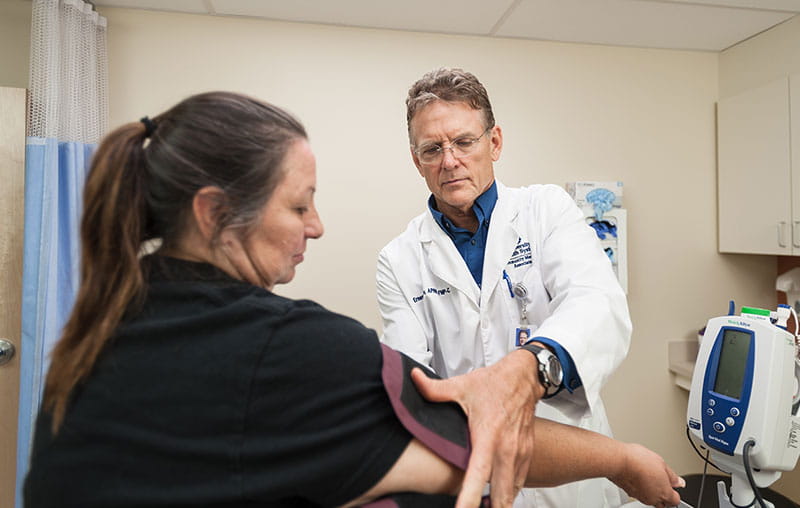Pregnancy & Postpartum Care
Being pregnant and having a baby can be a wonderful experience. People who are pregnant should receive prenatal care as early as possible to improve the likelihood of having a safe pregnancy and healthy baby. Lack of prenatal care can put parents-to-be and their babies at risk for health conditions during pregnancy and after birth.
Pregnancy may increase the risk for certain health conditions for pregnant people and affect their well-being. These can also have long-term effects on community health. Pregnant people and babies in Bexar County need access to quality care, support and education to stay safe and healthy.
Preventing Pregnancy & Childbirth Complications
Access to care before conception, during pregnancy and after having a baby is key to improving the health of new parents and babies in Bexar County. Early and regular doctor visits are the best way to prevent health issues during pregnancy.
Texans can get help to pay for medical care during pregnancy. Learn more about health coverage options online.
Education about pregnancy and childbirth is key. Outreach and resources are important to support people in need. This includes those experiencing mental health issues, substance use problems or domestic violence.
Prenatal Care
Health care providers can identify and treat health issues during prenatal care visits. This care is important for parent and baby. Pregnant people who receive prenatal care are more likely to be healthy. They also have a higher chance of having healthy babies.
The Office on Women’s Health reports babies born without prenatal care are more likely to be underweight or die than those born to parents who get prenatal care.
Prenatal care often includes:
- Regular physical exams
- Blood work
- Health screenings
- Ultrasounds
- Guidance and education on what to expect with pregnancy and childbirth
Prenatal Risks
Some health conditions a person has before becoming pregnant, or develops during pregnancy, can also affect a baby’s health. Health care providers will monitor for these conditions:
- Diabetes and gestational diabetes
- High blood pressure (preeclampsia)
- Infectious diseases including sexually transmitted infections (STIs)
- Food poisoning
Postpartum Risks
After giving birth, people are at risk of postpartum depression (PPD). The Centers for Disease Control and Prevention (CDC) lists the risk factors for PPD:
- Multiple births (twins, triplets, etc.)
- Lack of social support
- Personal and family history of depression
- Pregnancy or birth complications
- Preterm labor and delivery
- Teenage pregnancy
Pregnancy & Postpartum Care in Bexar County, Texas and the United States
- About 33% of pregnant people in Bexar County don’t receive prenatal care in the first trimester. The national rate is 15%.
- About 3% of pregnant people in Bexar County received no prenatal care in 2019. This is slightly above the national average.
- About 15% of pregnant people in Texas don’t have a postpartum checkup. Black and Hispanic women were less likely to have access to postpartum care.
- Bexar County has the highest number of pregnant women with serious substance use issues in the state. Substance abuse during and after pregnancy is dangerous. It can cause health issues and even death in mothers and babies.
Maternal Mortality in Texas and the United States
- Pregnant people in the United States are more likely to die from childbirth than pregnant people living in other developed countries.
- Texas consistently ranks worst in the nation for maternal mortality rates. One 2022 study listed it as the worst state to give birth in. These statistics are much worse for African American women, at 2.6 times the rate of white women. Discrimination causes roughly 12% of these deaths.
- About 27% of maternal deaths in Texas are due to suicide and homicide. Husbands and boyfriends commit most murders of pregnant women. The national average maternal deaths due to homicide is 8%.
University Health Resources
Women’s & Children’s Hospital
University Health offers care before, during and after your pregnancy. This includes programs and resources that protect you and your baby’s health.
The Women’s & Children’s Hospital offers:
- Benefits for anyone who delivers their baby here, including:
- Spacious labor and delivery suites
- Large postpartum rooms
- Customized nutrition for newborns
- Advanced maternal and neonatal care in warm and welcoming spaces
- High-risk pregnancy care from experts who monitor your pregnancy and delivery
- NICU for babies born too early or with special medical needs
- A Mother’s Place provides breastmilk storage, customized infant nutrition, lactation support and pumping stations for new moms
- Breastfeeding classes and lactation support
- 24/7 center for OB/GYN emergencies
The Women’s & Children’s Hospital is named a 2024 High Performing Maternity Care Hospital by U.S. News & World Report. Plus, Newsweek included University Hospital on their list of Best Maternity Hospitals in 2022 and 2023.
Women’s Health Clinics
University Health women’s health clinics are located across San Antonio. We provide:
- Free pregnancy tests
- Mammograms
- Gynecology services
- Heart care
BOOT CAMP FOR NEW DADS
A helpful, FREE, 3-hour workshop for first time dads!
Are you going to be a dad for the first time? Join our CareLink Boot Camp for New Dads! This workshop, led by experienced dads, offers interactive guidance to help you through the early stages of fatherhood. You will learn from dads who have been there before.
What you will learn:
- Keep your baby safe
- Stay calm when your baby cries
- Support your partner
- Bond with your baby
- Be part of a strong parenting team
- Handle stress at home and work
- Childproof your home
- Hold, feed, burp and change your baby
Why it’s important:
Parents need support. Babies need their dads. This workshop will give you the tools and confidence you need to be prepared for fatherhood.
Sign up today! Call 210-358-3290 or email CLOutreach@uhtx.com to register.
CenteringPregnancy Group
The CenteringPregnancy prenatal care program brings together a group of expectant moms who will deliver around the same time. The group classes are led by a certified nurse midwife who can answer questions and provide guidance leading up to the birth.
Nurse-Family Partnership
The Nurse-Family Partnership program helps moms have healthy pregnancies by connecting them with a dedicated nurse. First time moms receive continued assistance until their child is 2 years old.
Baby Bexar Program
Baby Bexar is here to support you through your pregnancy and postpartum journey. This program aims to improve maternal and infant health outcomes by offering a combination of community-based services and nurse case management.
From enrollment to up to a year postpartum, Baby Bexar ensures that you and your baby receive the care and attention you deserve. You’ll have a trusted team to assist with medical care, social services and more.
Eligibility Criteria:
- You should be 16 - 32 weeks pregnant
- Receiving care at a University Health clinic
- Planning to deliver at University Health Women’s & Children’s Hospital.
- Meet medical eligibility requirements*
*Medical eligibility criteria for the Baby Bexar program are outlined in our benefits guide. For more information, email Baby.Bexar@uhtx.com.
CareforMom Program
The CareforMom Program covers medical services for women who have given birth at University Health. CareLink automatically enrolls moms with no financial obligation and issues a CareforMom member card.
Membership starts the day after your baby is born and lasts for 12 months.
Mommies Program
The Mommies Program supports women with substance use disorder who are pregnant. The program provides prenatal care, doula services, methadone or buprenorphine treatment and recovery options, peer support, education and more.
Healthy Texas Women
Healthy Texas Women offers free women’s health and family planning services to low-income women. Services include health screenings and treatments before, during and after your pregnancy.
Community Resources
Family Violence Program
Family Violence Program is a free resource through the Texas Health and Human Services Commission. This program helps pregnant women affected by family violence. It also supports single mothers and other adults and children.
Postpartum Support Helpline & Online Support Meetings
Postpartum Support International offers free, 90-minute online support meetings for new parents. Their helpline provides confidential telephone support and information. You can also get connections to community resources.
Pregnancy Hotline
The American Pregnancy Hotline provides free, confidential support to individuals with questions about pregnancy. Call 866-942-6466.

Knowing your risk factors before pregnancy is key to a healthy journey.
Take our Prenatal Health Risk Assessment to better understand your risk for a high-risk pregnancy, so you can plan for a safe pregnancy and healthy baby.



